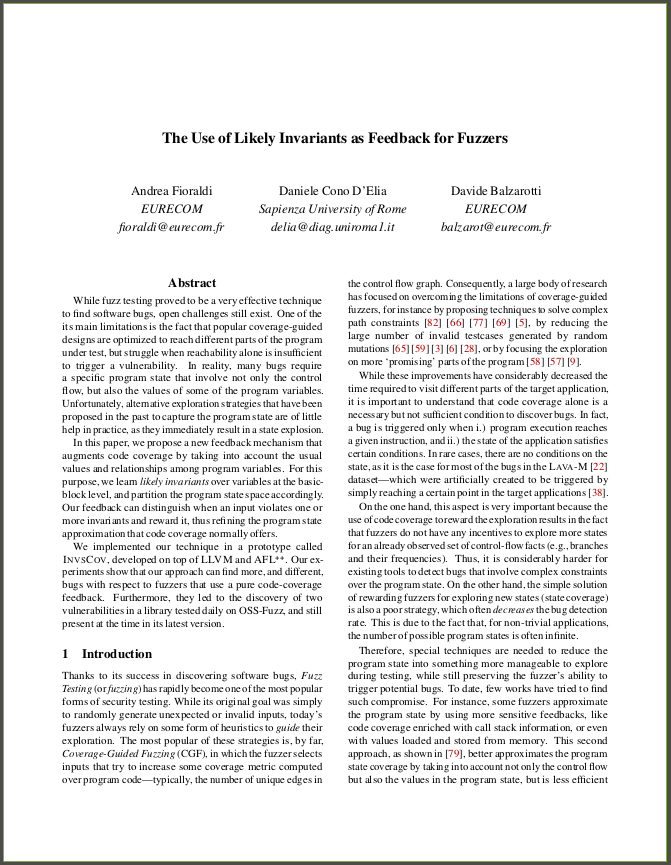This prototype implements the idea described in our USENIX Security '21 paper, a new feedback mechanism that augments code coverage by taking into account the usual values and relationships among program variables.
One of the main limitations of coverage-guided fuzzing is the fact that most of the available solutions are optimized to reach different parts of the program under test, but struggle when reachability alone is insufficient to trigger a vulnerability. In reality, many bugs require a specific program state that involves not only the control flow, but also the values of some of the program variables.
For this purpose, we learn likely invariants over variables at the basic- block level, and partition the program state space accordingly. Our feedback can distinguish when an input violates one or more invariants and reward it, thus refining the program state approximation that code coverage normally offers.
This prototype, called InvsCov, is based on AFL++, LLVM and the Daikon invariant detector.
- Andrea Fioraldi, Daniele Cono D’Elia, and Davide Balzarotti. The use of likely invariants as feedback for fuzzers. In 30th USENIX Security Symposium (USENIX Security 21), pages 2829–2846. USENIX Association, August 2021.
Bibtex:
@inproceedings {usenixsec21fioraldi,
author = {Andrea Fioraldi and Daniele Cono D{\textquoteright}Elia and Davide Balzarotti},
title = {The Use of Likely Invariants as Feedback for Fuzzers},
booktitle = {30th {USENIX} Security Symposium ({USENIX} Security 21)},
year = {2021},
isbn = {978-1-939133-24-3},
pages = {2829--2846},
url = {https://www.usenix.org/conference/usenixsecurity21/presentation/fioraldi},
publisher = {{USENIX} Association},
month = aug,
}LLVM 10 is required. It may work with more recent versions but it is untested.
Build the fuzzer and the passes with:
make -C InvsCov/dump LLVM_CONFIG=llvm-config-10
make -C InvsCov/instrument LLVM_CONFIG=llvm-config-10
make -C AFLplusplus
make -C AFLplusplus/llvm_mode LLVM_CONFIG=llvm-config-10
To compile Daikon, follow the steps in the Daikon readme and copy the resulting daikon.jar in the root folder of this project.
- set the env var
INVSCOV_OUTPUT_PATHto an existing empty folder
mkdir output_path
export INVSCOV_OUTPUT_PATH=`pwd`/output_path/
- compile the PUT with dump-cc[c++]
cd target_program_src/
./configure
make CC=/path/to/invscov/InvsCov/dump-cc CXX=/path/to/invscov/InvsCov/dump-c++
cp ./program ./program_dump # assuming that 'program' is the result of the compilation
- run reconstruct-dump
/path/to/invscov/InvsCov/reconstruct-dump
- run learn-invariants with the dumper binary produced in the second step
/path/to/invscov/InvsCov/learn-invariants /path/to/initial_corpus ./program_dump @@
- run generate-constraints
/path/to/invscov/InvsCov/generate-constraints
- compile with instrument-cc[c++]
make clean
make CC=/path/to/invscov/InvsCov/instrument-cc CXX=/path/to/invscov/InvsCov/instrument-c++
cp ./program ./program_fuzz
Using the NO_CONSTRS=1 env var the instrument-cc compiler wrapper will simply compile the PUT with the classic AFL++ edge coverage instrumentation.
Other env variables are available, refer to the source code.
- fuzz this last binary with afl-fuzz
/path/to/invscov/AFLplusplus/afl-fuzz -i /path/to/initial_corpus -o output -d -- ./program_fuzz @@
The modification to the AFL++ and Daikon codebases are released under the same license of the modified package.
The InvsCov code is released under Apache-2.

